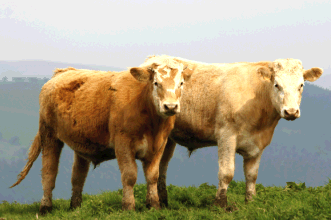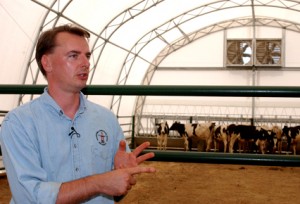
You may have read that a UN study concluded that raising cows and pigs contributed 18% of the greenhouse gasses we are all concerned about. They recommended that people reduce the amount of meat they are eating as part of human efforts to combat global warming.
 Frank M. Mitloehner, Ph.D, at the University of California-Davis campus studied this issue and found that the UN study contained wrong assumptions. He sent me a copy of his paper “Clearing the Air: Livestock’s Contribution to Climate Change” and here are some of his findings.
Frank M. Mitloehner, Ph.D, at the University of California-Davis campus studied this issue and found that the UN study contained wrong assumptions. He sent me a copy of his paper “Clearing the Air: Livestock’s Contribution to Climate Change” and here are some of his findings.
In the United States, EPA (2009) data show transportation accounts for at least 26% of total human-created GHG emissions compared to roughly 6% for all of agriculture, with less than 3% associated with livestock production. LLS attributed about a third of global GHG emissions associated with livestock to deforestation to create crop land for feed or pasture for grazing. Deforestation is not occurring in the United States – according to National Forest Service data, the amount of U.S. forest land has been stable for the past 100 years.
Air quality expert Frank Mitloehner said that giving cows and pigs a bum rap is not only scientifically inaccurate, but also distracts society from embracing effective solutions to global climate change. He noted that the notion is becoming deeply rooted in efforts to curb global warming, citing campaigns for “meatless Mondays” and a European campaign, called “Less Meat = Less Heat,” launched late last year.
Global animal product consumption is projected to more than double by 2050. The majority of increases will be in the developing world. The U.S. cattle herd has been shrinking, yet it is meeting the food needs for a growing population – this is a benefit of efficiency and intensification.
The focus of confronting climate change, he said, should be on smarter farming, not less farming. “The developed world should focus on increasing efficient meat production in developing countries where growing populations need more nutritious food. In developing countries, we should adopt more efficient, Western-style farming practices to make more food with less greenhouse gas production,” Mitloehner said.
EPA data show that transportation and energy use are the key contributors to greenhouse gas emissions in the United States. So when you are looking for ways that you can make a difference, focus on your energy and fossil fuel consumption. Your food choices also affect climate change but at much lower rate as energy use.

Way to go UCD! I love how nobody brings up that swamps, wetlands and rice paddies produce way more methane and carbon dioxide than all livestock.